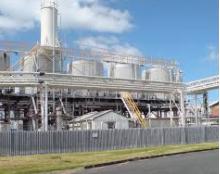
Gilead Science is the Tom Brady of the antiviral research world. No other company even comes close. The company's drugs have put the whammy on HIV/AIDS and cured hepatitis C. So it should not be surprising that remdesivir, which is the most promising experimental drug in the battle against the coronavirus was discovered by Gilead. These guys know what they are doing.
While there is not a single randomized clinical trial that proves that the drug does anything, there is a steady undercurrent of anecdotal "evidence," incomplete data from clinical trials, and "feel good" news stories. When coupled with the drug's potent inhibition of viral replication in lung cells and success in treating and preventing disease in monkey models, it is not unreasonable to conclude that remdesivir is the real deal.
But possibly the biggest hint at this time (1) is Gilead's enormous effort to scale up the synthesis of the drug despite the fact that it is a pain in the ass to make, something I wrote about recently. Yet an article in Chemical and Engineering News may provide the best evidence to date that Gilead expects the drug to work; the company is allegedly putting together a plan to make a whole lot of it. Gilead (wisely) didn't say much about their plan or lack thereof, but there is one quote to pay attention to:
“We continue to work on optimizing the chemical synthesis processes"
And while trying how to figure out how to make the process better the company is also cranking out a serious quantity of the drug, and quickly, improving manufacturing time from 9-12 months to 6-8 months.
In the C&E News article Daniel O’Day indicated some of the steps that the company is taking. These include:
- Gilead already has a fair amount of drug on hand an estimated 1.5 million doses – enough for 140,000 10-day courses – from its (failed) attempt to treat Ebola.
- The company plans on making another 500,000 courses (5.3 million doses) by October and one-million more by the end of the year.
- If needed, the company will make several million doses in 2021, both internally and in partnership with outside contractors.
If the drug works that won't be nearly enough. To put this in perspective, during the 2014 Ebola outbreak there were 29,000 cases over a period of 2.5 years. By contrast, there have been about 2.5 million COVID-19 cases over a five-month period. The demand will be overwhelming.
One manufacturing expert, who is either completely delusional or very good at his job, told the magazine:
“[Manufacturing remdesivir] is a medium complexity project,”
Ian Davies, director of internal and external scientific relationships for the Princeton Catalysis Initiative.
(I would hate to see what a "high complexity project" looks like because as a synthetic organic chemist, to me, the amount of effort it takes to make the stuff borders on horrifying.)
Gilead is not doing all of this for laughs. Making tens of millions of doses of a "medium complex" drug involves a whole lot of time, effort, brains, and money.
What does Gilead know that we don't? Would they being doing all this work if they didn't know or expect the drug to succeed?
Wait a few weeks and you'll see, This is when the data from the completed trials will begin to roll in. We are living in interesting times.
Disclaimer: My IRA includes some Gilead stock.



